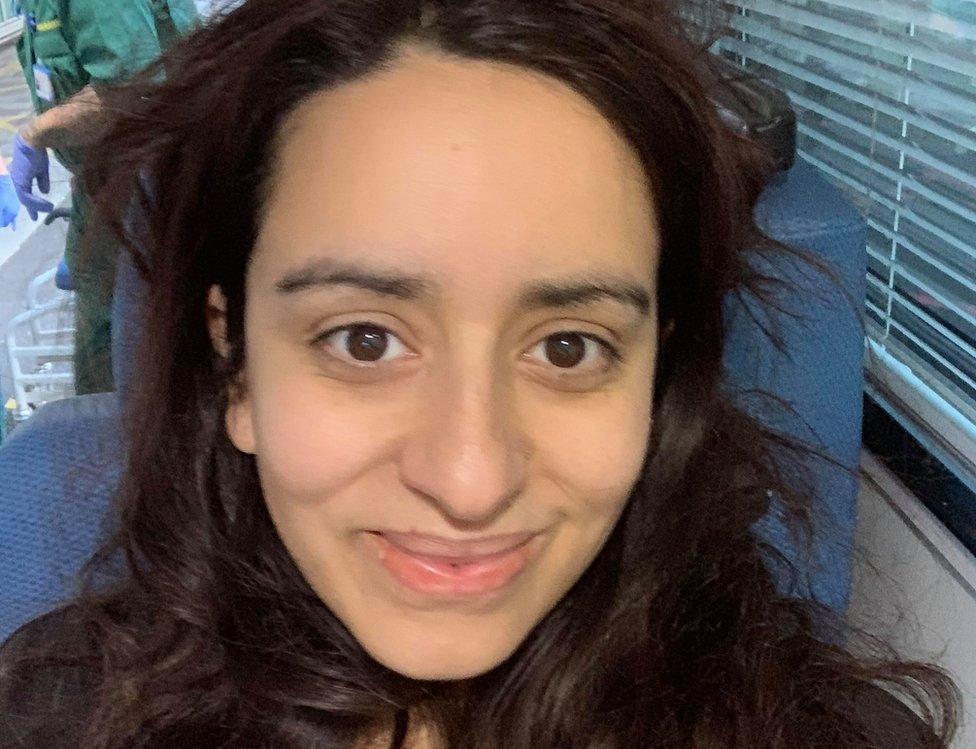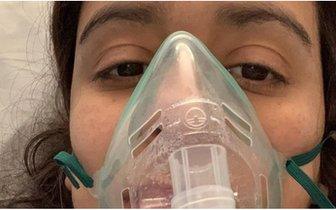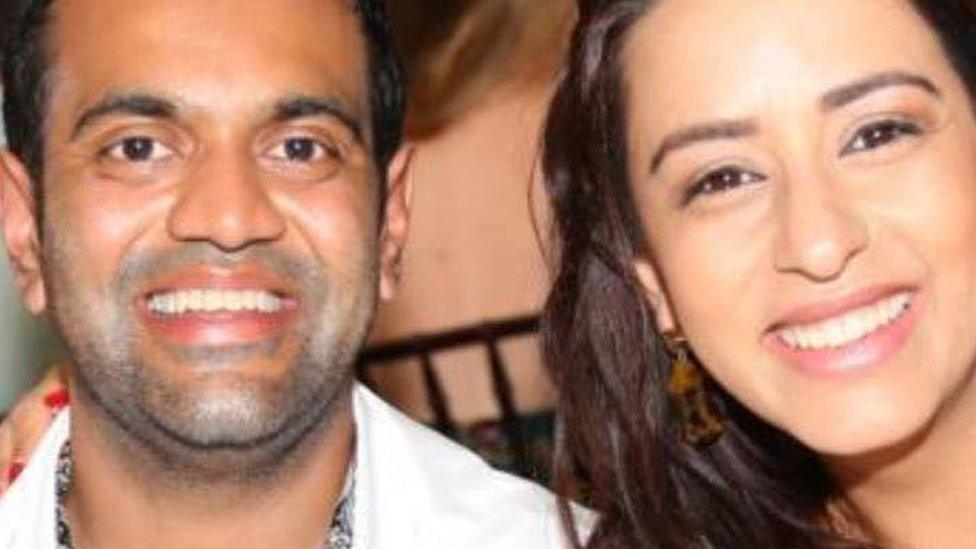Coronavirus: 'I'm out of hospital, but I have to remember to breathe'
- Published

Ria Lakhani on the day she was discharged from hospital
Breathing is perhaps the most natural of reflexes. Who has to remember to breathe?
Ria Lakhani does. In recovery at home in north-west London after a severe case of Covid-19, the sales executive is learning something that most of us never give a second thought to.
"It used to be such a natural action but now I have to remember how to inhale and exhale," she says.
In self-isolation, she still can't hug her husband, or see her parents and siblings. And she still wakes up at night struggling to breathe.
Ria started to show symptoms of Covid-19 while in hospital, where she had been admitted for an operation. Seven years ago, she was diagnosed with a rare condition which makes swallowing difficult and means she often regurgitates solids. The surgery was designed to help her manage this oesophageal disease, called achalasia.
But she stresses her condition had made her especially careful about looking after her health.
Her admission to hospital was supposed to be routine. But while recovering there she began to struggle with her breathing. She then developed a temperature.
While everyone hoped it was just a side-effect of her surgery, a Covid swab test was taken as a precaution. Ria was restless and started taking notes on her phone, documenting her experience on Facebook.
"My room was now cordoned off and the rest of the ward evacuated," she wrote. "I closed down an entire ward?! I miss my family so much. With Covid-19 tests so limited I felt ashamed I was being given a swab so quickly when there are others who were more likely to have it. I was certain I was clear. I followed all guidelines."
It was to no avail. Ria's virus test was positive.

Ria was given oxygen at hospital
As her condition deteriorated, and she required more oxygen, she was transferred to one of London's major Covid-19 treatment centres.
Ria remembers the concerned looks on the faces of doctors watching her during two difficult days and one night, as her body tried desperately to fight off the disease. She says what she went through in that time has irrevocably changed her.
"Things went from bad to worse - taking a breath became as hard as climbing a mountain," she wrote on Facebook. "I could see the more and more concerned looks on the faces of the many heroes treating me. More and more doctors looking in, murmuring to each other - observations taken every minute and scrutinised incessantly. Scary, uncertainty, unnerving, so many feelings, so many thoughts in my head, questions I was scared to hear the answers to."
"I almost died," she says, speaking from home to the BBC. "I almost didn't come out of there. There was a point when I actually started to write difficult messages to my family. I almost died now I'm alive. How can life go back to normal after that?"
Ria is not clear whether she developed pneumonia but says even now, from her recovery bed at home in Harrow she can hear a "crackling sound" in her lungs".

A SIMPLE GUIDE: How do I protect myself?
AVOIDING CONTACT: The rules on self-isolation and exercise
LOOK-UP TOOL: Check cases in your area
MAPS AND CHARTS: Visual guide to the outbreak

Her recovery has been slow. In hospital she could barely move at first and was given morphine on top of the oxygen because of the pain. She says it was hard to talk.
"Getting a sentence out was like running a marathon."
But amid it all, there were glimpses of hope. She developed a bond with a 96-year-old deaf woman, named Iris, in the neighbouring bed. They began to look out for each other despite the age difference.
"I needed her as much as she needed me," she adds.
And she found hope in the small acts of kindness of medical staff - "true heroes" in her words.
"It was the small wins and things like the nurses making sure Iris had a constant supply of hot tea and a sneaky extra slice of cake that made me smile."
At home, she has to maintain a distance from her husband and continues to be besieged by coughing fits.
But she's relieved that she was able to fight the virus, especially considering how many people have died.
"There was a point in this journey that I didn't know if I would see the light of day again. Nothing was certain, and even though I've always known how much I love my family - in those moments I learned how much I need them. I can't explain the moment I left the hospital, I'll never take anything for granted again."

Ria is back home with her husband but they now have to keep a distance from each other

Have you had coronavirus or know someone who contracted the virus? Share your experiences by emailing haveyoursay@bbc.co.uk, external.
Please include a contact number if you are willing to speak to a BBC journalist. You can also contact us in the following ways:
WhatsApp: +44 7756 165803
Tweet: @BBC_HaveYourSay, external
Send pictures/video to yourpics@bbc.co.uk, external
Please read our terms & conditions and privacy policy